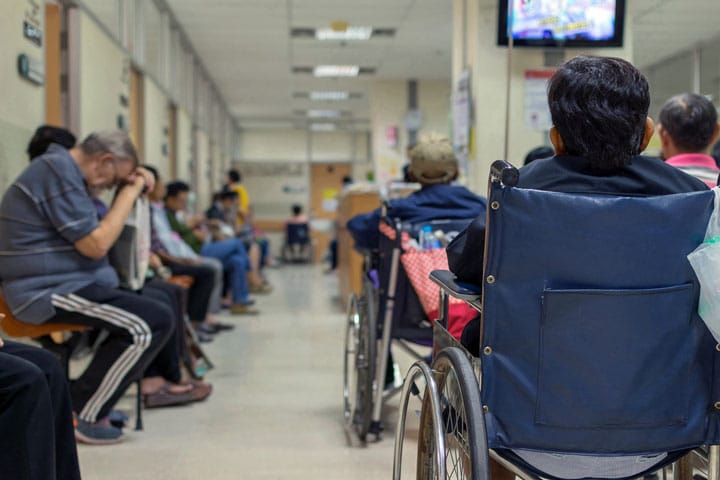Health risks for Thai people in 2020: Depression, stress due to fake news and particulate matter

The Thai population will run more health risks next year, with depression, stress due to fake news and harmful particulate matter being the main risk factors.
This is stated in a report by the Thai Health Promotion Foundation (ThaiHealth) that was published yesterday. The report lists ten risk factors.
According to figures from the Thai Department of Mental Health, an average of six people per hour try to kill themselves. Every year 300 young people commit suicide. The main reasons for this are family problems, followed by stress at work and online bullying.
ThaiHealth manager Supreeda says that many elderly people in Thailand suffer from diseases such as diabetes and heart disease due to an unhealthy lifestyle and wrong eating habits. This group is also extra vulnerable to fake messages and quackery. An example of this is a recent post about cancer that has been widely shared online, which says that the herb angkap nu (barleira prionitis) can cure the disease cancer, which of course is nonsense.
The population is also being warned about the increase in ultrafine particulate matter PM2,5, as this can cause serious respiratory disorders and other serious illnesses.
The WHO reported that 2016 million people worldwide died from air pollution in 7, and 91% of them live in Southeast Asia and the Western Pacific, Sufreeda said.
Source: Bangkok Post


There is little point in warning about particulate matter if the government does nothing about it.
The people who produce it will not change their behavior and the population cannot protect themselves against it.
In the article I find reason to put forward a thought, which, incidentally, only relates to the component smog as a result of the burning of fields and forests. I live north of Chiang Mai where the smog gets more and earlier every year.
The problem of smog in the north of Thailand plus large parts of Myanmar and Laos cannot, in my opinion, be solved by a so-called strict approach alone. In the tightly regulated and perfectly ordered Netherlands, that would even be quite a challenge.
The north of Thailand with its many forests and mountains and low population density is much more confusing and difficult to access. Moreover, we are all very busy with the smog troubles through all the newspaper reports, from the television and the mutual complaining.
Those who start the fires don't read and hear all this, it seems to me. The policy of vaguely and hopefully calling out every year that the government will do something about it has not yielded any results in recent years. It's only getting worse.
I believe more in a campaign that relies on the (more or less) natural authority of three collaborating partners; parties that matter in Thailand, namely the pulmonologists, influential monks and the government, each from their own "reach".
Do you realize that thousands if not tens of thousands of patients come to pulmonologists every year, especially the people from the mountains, who do not see and hear our news media and may be less aware of this problem.
Now imagine that all pulmonologists in the north would compile a simple but appealing brochure in which - in clear cases - the relationship between their heating behavior and the consequences for their lungs is clear! is drawn out.
These brochures are not - like in the waiting room of your GP - in stands, but are consciously and actively distributed to all patients of the pulmonologist and are firmly brought to the attention or explained. And it is also promoted that the brochures are taken along to the patients in their own environment and thus end up in a more targeted way, especially with the peasantry and mountain people.
Assuming that the monk world also knows and will experience the problem. When I see how much influence some top monks have on many Thais and especially the hill tribes, it must be possible to find a way to make them - from their position and power - share in the problem and therefore also in the solution.
The role of initiator for this policy could only lie with the government, preferably spread over not too many ministries and services, because then we all know what is happening. And only as the last component of this 3-party policy could the government take repressive measures. Then a firm approach, in which examples are set, is also responsible, acceptable and useful.
Obviously there is a lot to be said about this idea of this multi hopping pup approach, but try to see it along these lines….
The government does nothing about particulate matter.
The rule is still setting everything on fire and that is already noticeable.
After the rice fields, cane sugar fields are currently lit every evening.
And that continues until the first rain comes in April
There are rules (forbidden to burn fields, etc.) but enforcement is lacking. Some are happy with a government that looks away and does not enforce. Now rules and enforcement alone are not the solution, public awareness of where particulate matter comes from and the consequences is also part of the solution. Stopping spraying water from tankers and promoting virtually useless face masks would also make a difference. Of course, the farmers and the villages must also be helped when it comes to how to deal with leftovers on the field and household waste, etc.